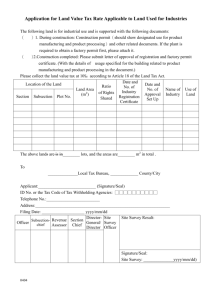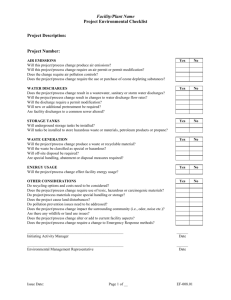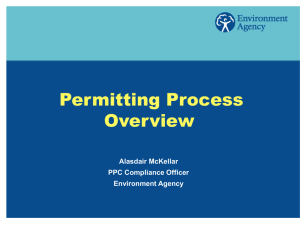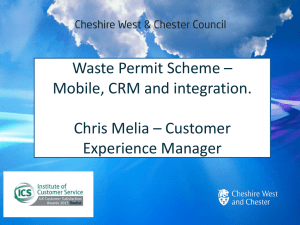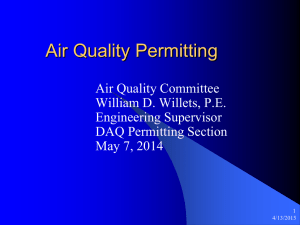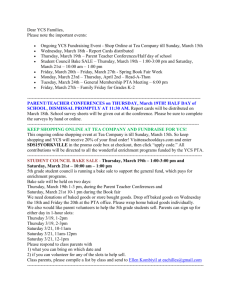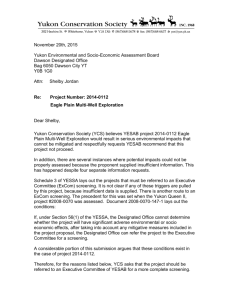There are eight regulations under the Environment Act that require
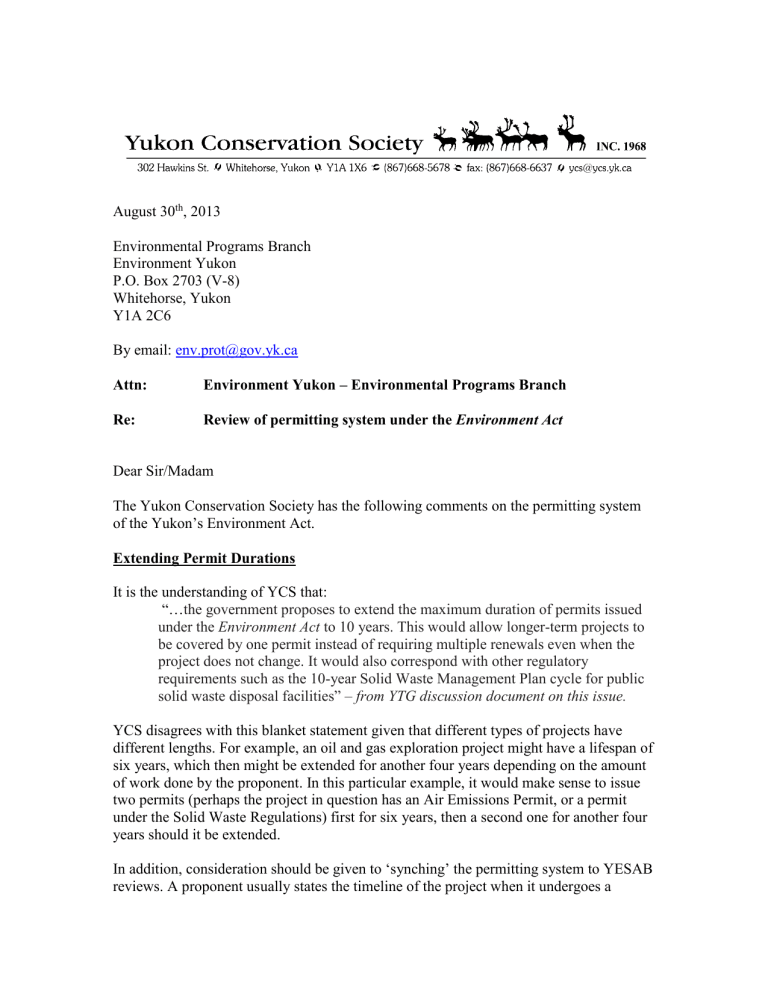
August 30 th
, 2013
Environmental Programs Branch
Environment Yukon
P.O. Box 2703 (V-8)
Whitehorse, Yukon
Y1A 2C6
By email: env.prot@gov.yk.ca
Attn:
Re:
Environment Yukon – Environmental Programs Branch
Review of permitting system under the Environment Act
Dear Sir/Madam
The Yukon Conservation Society has the following comments on the permitting system of the Yukon’s Environment Act.
Extending Permit Durations
It is the understanding of YCS that:
“… the government proposes to extend the maximum duration of permits issued under the Environment Act to 10 years. This would allow longer-term projects to be covered by one permit instead of requiring multiple renewals even when the project does not change. It would also correspond with other regulatory requirements such as the 10-year Solid Waste Management Plan cycle for public solid waste disposal facilities” – from YTG discussion document on this issue.
YCS disagrees with this blanket statement given that different types of projects have different lengths. For example, an oil and gas exploration project might have a lifespan of six years, which then might be extended for another four years depending on the amount of work done by the proponent. In this particular example, it would make sense to issue two permits (perhaps the project in question has an Air Emissions Permit, or a permit under the Solid Waste Regulations) first for six years, then a second one for another four years should it be extended.
In addition, consideration should be given to ‘synching’ the permitting system to YESAB reviews. A proponent usually states the timeline of the project when it undergoes a
YESAB review (for example, when establishing an exploration mining camp that might require a permit under the storage tank regulations). Using this example the timeframe of the YESAB review is typically for five years. It would make sense for this permit to be linked to the length of the exploration mining camp (five years).
Furthermore, ten year permits would make it difficult to adapt to changes in knowledge
(e.g. wildlife information or information about toxicity of substances), changes to regulations (e.g. emissions standards), and changes to land tenure and planning (e.g. development and implementation of land use plans, settlement of land claims, etc.) In order to provide the flexibility to adapt permits to changing conditions, permits should be kept to the shortest amount of time that is practical for a project.
YCS has further comments on Permit Durations below in the section headed Contaminant
Regulations.
Eliminating Application Fees
It is the understanding of YCS that “ the government proposes to eliminate permit application fees for permits required under the Environment Act . This is intended to promote fairness and compliance. It would also make it easier to apply for a permit; with no payment required, applications could be emailed, faxed as well as mailed” – from
YTG discussion document on this issue.
While YCS overall agrees with this approach, on one permitting regulation YCS is of the opinion that fees should not be scrapped. The Storage Tank Regulations have Schedule A
(an extract is copied below) which would appear to increase fees based on tank size. This is appropriate especially when one approaches the larger tanks. For example, a million litre above ground storage tank would require a permit fee of $415. This is probably a good thing, as one would want to assume a company installing a tank of such a size has the fiscal resources to properly maintain, monitor and repair such a facility. Having the incremental permitting fee is one way of establishing this. As a final note on this, the fee does seem very small for establishing such a large tank. Should there be an accident with a tank this size, does the permitting system establish environmental bonding or insurance to pay for a clean-up?
STORAGE TANK REGULATIONS
16.(1) A person applying for a permit, or an amendment or renewal to a permit shall submit the fee prescribed in Schedule A to the Minister with the application for the permit.
SCHEDULE A - PERMIT FEES
I_T__E_M______D_E_S_C__R_I_P_T__IO__N________________________F_E_E______
1. Construct, alter or operate storage tank system
(a) underground storage tanks tanks up to 5,000 litres $100.00 tanks 5,001 litres to 20,000 litres $5.00/additional 1,000 litres tanks 20,001 litres and greater $2.00/additional 1,000 litres
(b) aboveground storage tanks
tanks up to 10,000 litres $25.00 tanks 10,001 litres to 100,000 litres $1.00/additional 1,000 litres tanks 100,001 to 500,000 litres $0.50/additional 1,000 litres tanks 500,001 litres and greater $0.20/additional 1,000 litres
There is also the legal issue of a contract being established when money changes hands.
By paying a fee, no matter how small, a legal contract is established with duties and obligations imposed upon both parties (in this case the Government issuing the permit and the individual or company receiving the permit). By eliminating the fee, there could potentially be a weakening of the legal obligations incumbent on both parties within the
Environment Yukon permitting system. YCS strongly recommends that legal advice and clarification be sought on this issue.
YCS understands that it is the intention of the Yukon Government that:
“The government proposes to have the regulations make it clear that the government may charge applicants fees for the review of permit applications and supporting documents prior to the issuance of a permit. This change would increase the transparency of the permitting process as well as ensure that proponents – not taxpayers – cover all costs associated with the technical review of their permit applications.” from YTG discussion document on this issue.
It might be appropriate to indicate roughly what charges these fees could be. This would allow applicants to adequately budget for the government’s review. Some applicants could have quite complicated proposals (such as a waste to energy plant) which could require a long, complicated and no-doubt expensive review.
Transparency
YCS encourages the Yukon Government to put all permits issued under the Environment
Act onto a public-accessible database. This would permit Yukoners easy access to what and where is being stored, released or disposed into the Yukon environment.
Gaps in the Current Permitting System
YCS encourages the Yukon Government to develop permitting regulations dealing with:
Noise
Greenhouse gas emissions
Light pollution.
YCS does not feel these issues are adequately addressed under the current permitting system, nor are they adequately address elsewhere within a Yukon context (noise bylaws under the municipal system are weak, greenhouse gas emissions are not regulated at all, and the same with light pollution).
Air Emission Regulations
YCS encourages the expansion of the Air Emission Regulations to cover vehicle emissions. It would not appear to be part of the current permitting system. There should be regulations and associated permitting concerning how polluting vehicles are allowed to be.
YCS also notes with concerns that emergency flaring or burning of oil and gas activities are not covered in the Air Emission Regulations – Schedule 1. In addition, unintentional leaks from fossil fuel activity (be it at the wellhead, pipelines, or at storage facilities) can be substantial. Unless these amounts are monitored it is not possible to see how polluting this sector can be. YCS suggests that permits regarding oil and gas activities under the air emission regulation note these sources of emissions and ensure the permit holder monitors and reports such activities.
Further to this, with the possible establishment of Liquefied Natural Gas (LNG) facilities by both Yukon Energy Corporation and Yukon Electrical Company Limited there should be clear inclusion of LNG emissions and its use within the permitting system. Section 8 of Air Emission Regulations - Schedule 1 should be modified accordingly.
AIR EMISSION REGULATONS
SCHEDULE 1 - SCHEDULE OF ACTIVITIES THAT REQUIRE A PERMIT
1. Manufacturing of asphalt.
2. Production and exploration of oil and natural gas, including combustion products of flaring or burning petroleum and the release of petroleum vapours, but not including the release of combustion products or vapours that may occur during emergency flaring or burning.
…
8. Operation of electricity generating facilities with a maximum nameplate capacity equal to or more than 1.0 Megavolt ampere (at unity power factor equivalent to 1.0 megawatt).
Pesticide Regulations
YCS encourages the Yukon Government to move towards a total pesticide ban within the
Territory. That being stated, YCS recognizes the need to regulate and permit pesticides until such time as a ban can be implemented.
YCS strongly encourages Section 4.2 of the Pesticide Regulations be dropped:
Banned pesticides and fertilizers
4.(1) Subject to subsection (2), no person shall import, possess, buy, sell, supply, distribute, use or apply in the Yukon a pesticide or fertilizer listed in Schedule 2.
(2) Notwithstanding subsection (1), a person may use or apply a pesticide that is not registered under the Pest Control Products Act (Canada) or a fertilizer that is not registered under the
Fertilizers Act (Canada) for research purposes where that person has secured a pesticide use permit for that research use or application.
The Yukon must never be used a guinea pig for pesticides that have not been approved for use elsewhere in Canada. Known pesticides are bad enough without introducing uncertainty.
Toxic pesticides like chlorthal-dimethyl and trichlorfon should be added to Schedule 4,
Pesticides and Fertilizers that Require a Pesticide Use Permit . It must be noted that
Europe has already banned them, so why are they still being used in the Yukon? At the very least, a permit should be required for their use.
Contaminant Regulations
Currently under Section 17.4 of the Contaminants Regulations a Land Treatment Facility may have a permit issued or renewed for a period of up to three years. YCS agrees with this time frame, and does not think it should be changed. This permits all parties concerned to ensure constant monitoring and updating of data (groundwater testing, soil sampling etc.). Should a ten year or longer permit be issued there is the potential to let some of these data gathering exercises lapse.
Solid Waste Regulation
Mention is made in Section 11.1 of a public register that records the names of persons to whom permits have been issued. This registry should be available online.
If you have any questions, please contact the undersigned.
Yours truly
Lewis Rifkind
Mining Coordinator
Yukon Conservation Society
Tel: 867-668-5678 email: ycspipe@ycs.yk.ca
www.yukonconservation.org
